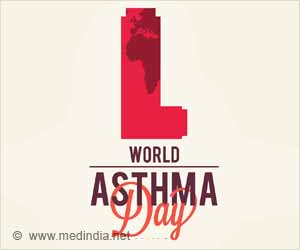Vaccinating asthmatic pre-schoolers against the flu could reduce their risk of being hospitalized after an asthma attack researchers find.
- Researchers make a strong case of vaccinating asthmatic kids against flu
- There was a thirty-seven percent or more chance of kids not responding to standard asthma medications if they had moderate or severe asthma and the flu, compared to thirteen percent of children with asthma but without a virus
- The study team feels that having the flu vaccine at the asthma, respiratory or general pediatric clinics would get more people to take the vaccine
"These kids should get their flu shot and they should get it systematically - it's worth it," said study co-author Francine Ducharme, a pediatrician and clinical epidemiologist at CHU Sainte-Justine who is a professor of pediatrics at UdeM.
The study is published in the journal Pediatrics.
Study based on the national DOORWAY (Determinants of Oral Corticosteroid Responsiveness in Wheezing Asthmatic Youth)
The study was conducted by Ducharme and colleagues between 2011 and 2013 with funding from the Canadian Institutes of Health Research.
The kids were treated with standard treatments for their asthma attacks (oral corticosteroids and inhaled bronchodilators).
- Twenty percent of the kids with respiratory viruses did not respond to the asthma medications and needed to be hospitalized
- The children with influenza or parainfluenza had a thirty-seven percent or more chance of not responding to asthma medication, compared to thirteen percent of children without a virus
- Kids with the respiratory syncytial virus (RSV) also had high failure rates
- Kids infected by strains of human rhinoviruses (HRVs) which is the usual cause of common cold responded well to asthma medication; a positive outcome since HRVs are the most frequent trigger of asthma attacks that take the kids to ER
Researchers Offer a Simple Solution
Influenza is the only respiratory virus that is vaccine-preventable, and it would be wise for kids with asthma to get vaccinated yearly, in the fall, before flu season starts. In Quebec, where the study was conducted every child who is diagnosed with asthma is eligible for influenza vaccination but many parents do not make use of the opportunity due to accessibility issues and the time taken to make an extra trip to a CLSC or public-health clinic.Only 60 percent of the people get the shot nowadays. Quach feels that this issue can be solved if the flu vaccine is available on site at the asthma, respiratory or general pediatric clinics at Sainte-Justine.
In fact, Quach and her student Joanna Merckx, then a McGill clinical fellow in pediatric infectious diseases have already run a free flu-vaccination clinic in the premises of the Montreal Children’s Hospital from 2012 to 2014 and had great success immunizing 2,640 kids who had high-risk conditions like asthma. It was easier to get hold of children coming in for their regular visits and give them the flu vaccine.
The researchers claim that even if flu vaccines have their drawbacks, public-health policy makers have to make it easy for parents to get their children vaccinated, and encourage them to do so.
The chronic disease often starts in the pre-school years, even before the kid reaches six years of age.
"Everybody who has an asthmatic child should hear that influenza is bad news - the child might have an attack that needs hospitalization," Quach said. "They need to ask for the flu vaccine yearly."
Asthma
Asthma is a chronic condition where the bronchial tubes (the main passageway through which air enters and leaves the lungs) get inflamed and becomes narrow making it difficult for the person to breathe. The condition is characterized by coughing, shortness of breath, tightness in the chest and wheezing. The symptoms affect around 26 million Americans and 3 million Canadians. It is one of the leading causes of absences from work and school.There are two types of asthma. One is allergic or extrinsic asthma caused by exposure to an allergen such as pollen, pet dander, dust mites, and mold. The other kind of asthma is nonallergic or intrinsic asthma caused by triggers such as stress, exercise, colds, the flu, extreme weather conditions, irritants in the air like smoke and chemical fumes or certain medications and food additives.
Asthma is best managed by prevention; a person prone to an asthma attack should be aware of what situations can trigger an attack and try to avoid them.
References:
- Joanna Merckx, Francine M. Ducharme, Christine Martineau, Roger Zemek, Jocelyn Gravel, Dominic Chalut, Naveen Poonai, Caroline Quach. Respiratory Viruses and Treatment Failure in Children With Asthma Exacerbation. Pediatrics, 2018; e20174105 DOI: 10.1542/peds.2017-4105
- Asthma - (https://acaai.org/asthma/about)
Source-Medindia
















